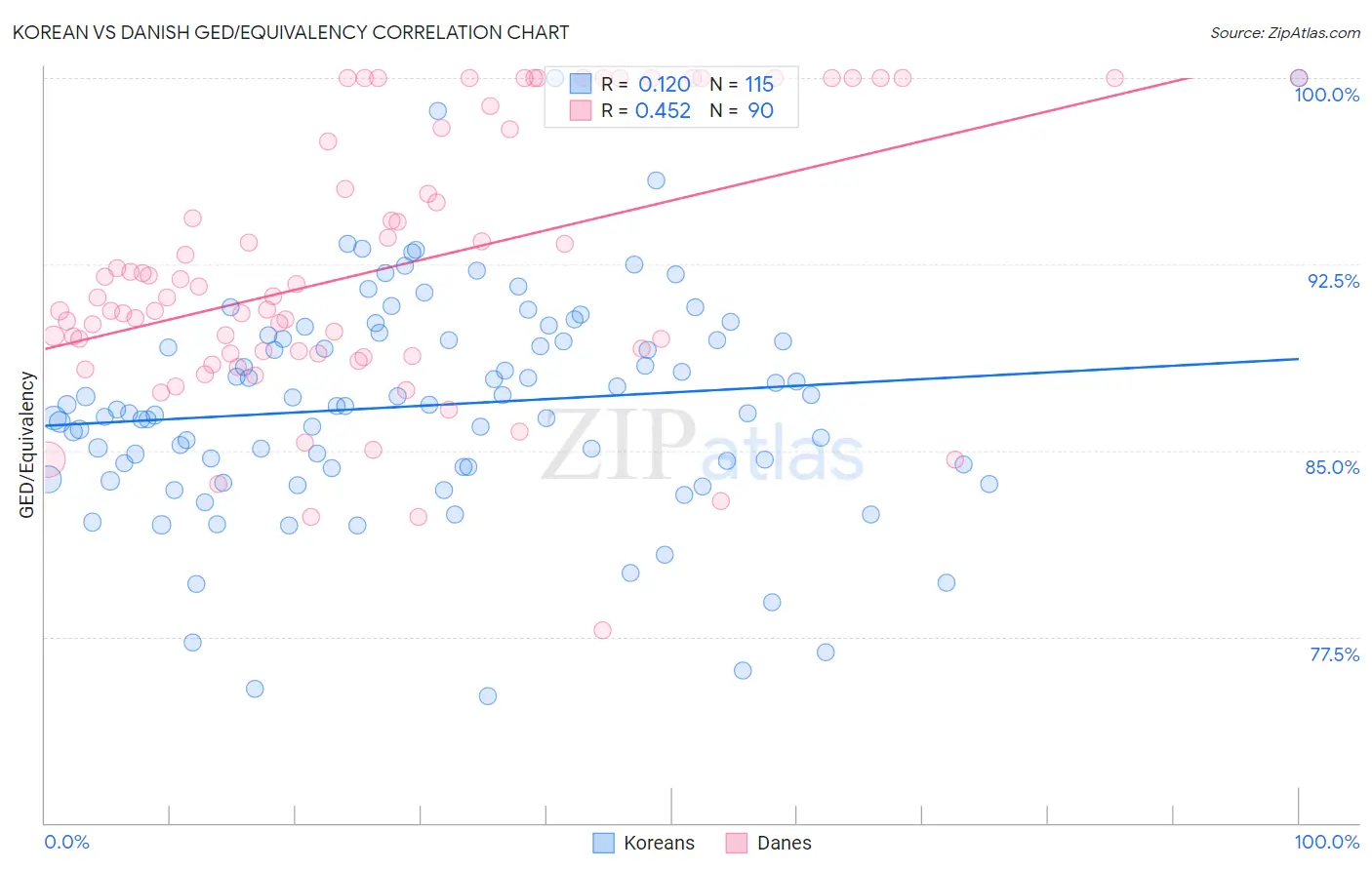Korean vs Danish GED/Equivalency
COMPARE
Korean
Danish
GED/Equivalency
GED/Equivalency Comparison
Koreans
Danes
85.6%
GED/EQUIVALENCY
41.2/ 100
METRIC RATING
178th/ 347
METRIC RANK
88.4%
GED/EQUIVALENCY
99.8/ 100
METRIC RATING
32nd/ 347
METRIC RANK
Korean vs Danish GED/Equivalency Correlation Chart
The statistical analysis conducted on geographies consisting of 510,944,156 people shows a poor positive correlation between the proportion of Koreans and percentage of population with at least ged/equivalency education in the United States with a correlation coefficient (R) of 0.120 and weighted average of 85.6%. Similarly, the statistical analysis conducted on geographies consisting of 474,193,540 people shows a moderate positive correlation between the proportion of Danes and percentage of population with at least ged/equivalency education in the United States with a correlation coefficient (R) of 0.452 and weighted average of 88.4%, a difference of 3.3%.

GED/Equivalency Correlation Summary
| Measurement | Korean | Danish |
| Minimum | 75.1% | 77.8% |
| Maximum | 100.0% | 100.0% |
| Range | 24.9% | 22.2% |
| Mean | 86.8% | 92.3% |
| Median | 86.8% | 91.2% |
| Interquartile 25% (IQ1) | 84.3% | 88.9% |
| Interquartile 75% (IQ3) | 89.5% | 97.9% |
| Interquartile Range (IQR) | 5.2% | 9.0% |
| Standard Deviation (Sample) | 4.5% | 5.4% |
| Standard Deviation (Population) | 4.5% | 5.3% |
Similar Demographics by GED/Equivalency
Demographics Similar to Koreans by GED/Equivalency
In terms of ged/equivalency, the demographic groups most similar to Koreans are Aleut (85.6%, a difference of 0.020%), Immigrants from Southern Europe (85.5%, a difference of 0.060%), Immigrants from Uganda (85.7%, a difference of 0.080%), Moroccan (85.5%, a difference of 0.080%), and Immigrants from Eastern Africa (85.7%, a difference of 0.13%).
| Demographics | Rating | Rank | GED/Equivalency |
| Immigrants | Chile | 57.3 /100 | #171 | Average 85.9% |
| Bermudans | 55.1 /100 | #172 | Average 85.8% |
| Immigrants | Venezuela | 50.7 /100 | #173 | Average 85.8% |
| Ottawa | 50.0 /100 | #174 | Average 85.8% |
| Immigrants | Bolivia | 49.8 /100 | #175 | Average 85.8% |
| Immigrants | Eastern Africa | 47.7 /100 | #176 | Average 85.7% |
| Immigrants | Uganda | 45.2 /100 | #177 | Average 85.7% |
| Koreans | 41.2 /100 | #178 | Average 85.6% |
| Aleuts | 40.5 /100 | #179 | Average 85.6% |
| Immigrants | Southern Europe | 38.4 /100 | #180 | Fair 85.5% |
| Moroccans | 37.7 /100 | #181 | Fair 85.5% |
| Sudanese | 35.2 /100 | #182 | Fair 85.5% |
| Immigrants | Sudan | 34.2 /100 | #183 | Fair 85.5% |
| Immigrants | Oceania | 33.6 /100 | #184 | Fair 85.5% |
| Spanish | 32.8 /100 | #185 | Fair 85.4% |
Demographics Similar to Danes by GED/Equivalency
In terms of ged/equivalency, the demographic groups most similar to Danes are Bhutanese (88.4%, a difference of 0.020%), Immigrants from Sweden (88.4%, a difference of 0.040%), Turkish (88.5%, a difference of 0.050%), Immigrants from Japan (88.4%, a difference of 0.050%), and Immigrants from South Central Asia (88.4%, a difference of 0.060%).
| Demographics | Rating | Rank | GED/Equivalency |
| Estonians | 99.8 /100 | #25 | Exceptional 88.6% |
| Immigrants | Australia | 99.8 /100 | #26 | Exceptional 88.6% |
| Immigrants | Lithuania | 99.8 /100 | #27 | Exceptional 88.6% |
| Immigrants | Northern Europe | 99.8 /100 | #28 | Exceptional 88.5% |
| Poles | 99.8 /100 | #29 | Exceptional 88.5% |
| Turks | 99.8 /100 | #30 | Exceptional 88.5% |
| Bhutanese | 99.8 /100 | #31 | Exceptional 88.4% |
| Danes | 99.8 /100 | #32 | Exceptional 88.4% |
| Immigrants | Sweden | 99.7 /100 | #33 | Exceptional 88.4% |
| Immigrants | Japan | 99.7 /100 | #34 | Exceptional 88.4% |
| Immigrants | South Central Asia | 99.7 /100 | #35 | Exceptional 88.4% |
| Immigrants | Belgium | 99.7 /100 | #36 | Exceptional 88.3% |
| Immigrants | Austria | 99.7 /100 | #37 | Exceptional 88.3% |
| Burmese | 99.7 /100 | #38 | Exceptional 88.3% |
| Immigrants | Israel | 99.6 /100 | #39 | Exceptional 88.2% |